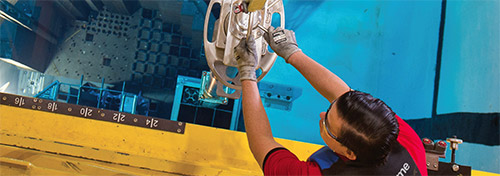Framatome: Taking an International View
Lynchburg is Framatome’s North American headquarters and home to Framatome’s Operational Center of Excellence for Nuclear Products & Services in North America. The fuel, installed base, I&C, and engineering and technology business units, as well as most corporate functions, operate out of three Lynchburg-based sites.
Q4 2019

Virginia Economic Review: When you think of manufacturing in the nuclear power industry in the U.S. over the next five to 10 years, what do you see as the major trends? How are things changing in your industry and manufacturing in the United States?
Gary Mignogna: The nuclear market is a difficult one these days, but we’re holding our own. I don’t think anybody is going to be building what’s considered generation three or larger reactors anytime soon in the U.S. But we think there’s a strong case for smaller reactors.
With the new smaller reactor designs that will be rolling out, probably the first ones starting construction in the 2022 time frame, I think it’s more feasible for manufacturers in the U.S. to produce the components associated with them because they’ll be smaller.
Right now, the U.S. has really lost its infrastructure for the large reactor components. There haven’t been any built in the U.S. for a very long time.
VER: Do you see smaller components where there’s still a good bit of activity? Possibly in replacement parts, things like that?
Mignogna: Yes, replacement parts for sure. Flowserve is still making valve actuators. They’re located in Lynchburg, Virginia. We stock their parts and resell them to customers. A lot of times, they’ll be for safety-related applications.
VER: What do you think states and regions could do to better position themselves to retain their existing manufacturing investment, as well as attract new investment in the future?
Mignogna: The big thing is international competition. These days, investments require, really necessitate, an international view. I know particularly in our area, you’re not going to justify investments based just on the U.S. market. You’ve got to justify investments based on the international market.
VER: What do you think about the workforce of the future? Are there things states should be doing that they’re not doing now?
Mignogna: In the past, everybody wanted to push young people into four-year college programs. Not every young person was really suited for that. They spent a lot of money and really extracted little value out of the experience.
Once you remove that expectation that everybody has to go to a four-year college, you’re going to see a lot more people go into the trades. Trades are well-paying. You don’t need a four-year degree to have a good-paying job.
VER: From your perspective, what do you think makes Virginia an attractive place for manufacturers?
Mignogna: We have a fantastic environment here in Virginia to really create a good manufacturing workforce. We have an excellent college system, an excellent community college system. We have organizations like Beacon of Hope (BOH) here in Lynchburg that are counseling kids and encouraging them to go into some type of post-secondary education. If a four-year college is not for them, then go for a post-secondary education leading into the trades. We have all the right ingredients to make it happen. BOH gives them the resources to help them be successful and thus build the future workforce.
We use a lot of what I would say are light manufacturers and machine shops to build parts for us. We take them, we integrate, assemble, test, and deploy. There’s really a very solid infrastructure of that in Virginia. Most heavy manufacturers need that kind of local capability to support them. So, we have a future workforce being developed and we have the infrastructure support necessary to attract larger manufacturers.
Project Announcements
SencorpWhite Plans Hamilton, Ohio, Headquarters-Manufacturing Operations
12/29/2025
Kraken Technologies Limited Plans New York City Headquarters Operations
12/29/2025
Lupin Expands Coral Springs, Florida, Operations
12/29/2025
KPPC Advanced Chemicals Expands Casa Grande, Arizona, Operations
12/29/2025
Volvo Group Plans Tacoma, Washington, Distribution Operations
12/29/2025
Alnylam Pharmaceuticals Expands Norton, Massachusetts, Operations
12/29/2025
Most Read
-
The Workforce Bottleneck in America’s Manufacturing Revival
Q4 2025
-
Rethinking Local Governments Through Consolidation and Choice
Q3 2025
-
Data Centers in 2025: When Power Became the Gatekeeper
Q4 2025
-
Lead with Facts, Land the Deal
Q3 2025
-
Tariff Shockwaves Hit the Industrial Sector
Q4 2025
-
Investors Seek Shelter in Food-Focused Real Estate
Q3 2025
-
America’s Aerospace Reboot
Q3 2025